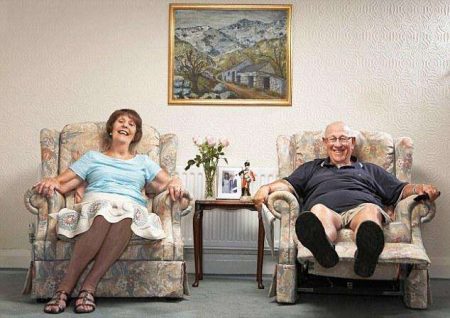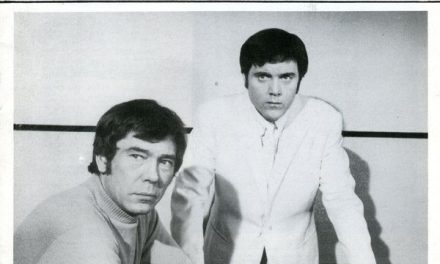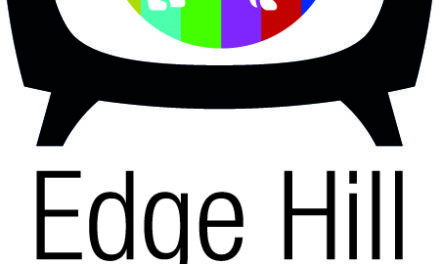June and Leon Bernicoff, a progressive Liverpool couple married for over 60 years, were never your typical reality TV stars. But since the premiere of of Gogglebox (2013-present, Channel 4), the two retired teachers became early favorites since the series 2013 premiere, essentially due to their empathy and openness towards difference, marital banter suffused with unrelenting affection, as well as their liberal-minded commentary on British politics and global events. It was also their genuine charm and warmth, alongside Leon’s special brand of unabashed honesty (for example, once calling Nigel Farage a “dickhead”) that his recent December 23rd passing shook devoted fans and admirers. Twitter tributes came flooding from regular Gogglebox viewers and public figures, the series creator Tania Alexander to Oasis’ Liam Gallagher to Strictly Come Dancing winner Ore Oduba. Likewise, nearly every major UK publication provided a form of obituary or commemoration of Leon, often joined with iconic photos of June and Leon in their side-by-side armchairs, where Gogglebox viewers found them every week for the past four years.
As I previously stated in a 2014 piece on the now defunct Antenna TV, Gogglebox, the popular BAFTA-winning series documenting a variety of Brits watching numerous television programming, from classic films to controversial news, gave me rare insight into the personal politics fueling both sides of the nationalist debates that led to the rise of UKIP and the 2016 Brexit. Brexit and the Trump era left me, like many, feeling utterly disheartened. Leon and June’s acceptance of migrants often alleviated this, and gave me faith, on a weekly basis.
When many native Britons, including some of those on Gogglebox, expressed nationalistic views in favour of Brexit, Leon and June remained a beacon of hope and progressive attitudes. One often associates these views with a certain type of Londoner, typically between the ages of 18-45, who supports the rights of immigrants, the LGBTQIA community, disabled people and ethnic and racial minorities. That a quintessentially Scouse elderly couple embodied the same attitudes from a pure position of openness provided many viewers with a feeling of optimism. Leon and June ardently defied the majority opinion of the Brexit “Leave” voting results. And Gogglebox’s critical and commercial success proved to influence the nation in tumultuous times. As the series creator Tania Alexander stated in my 2015 three-part interview with her on CST, she pushed the Friday night program beyond pure entertainment and used the platform to challenge the status quo and create a national forum of varying opinions:
“The regular inclusion of news and current affairs are vitally important to me. Not only for the topicality but also because it provides a little sample of how every day people view things. A sample slice of what the man on the street really thinks, especially when it’s politics. I’ve heard a few politicians watch it. David Cameron has admitted to being a Gogglebox fan, apparently he and his wife love it. I find it hilarious, as we’ve been very rude about him. He said recently to a journalist during his campaign trail that he considers it a ‘very clever programme’. I think it certainly is a good way to see what the average person thinks and maybe give the politicians a blink of that.
I feel it’s really important because there’s no other platform out there at the moment, I mean we’ve got Question Time. But there’s no other platform like this, where else on TV can you say David Cameron’s got a woman’s mouth? Where else can you say Nick Clegg has a face that looks like he’s got bad breath? Where else can you say this besides on Twitter? Everyone expects to be entertained on Gogglebox, but I think it’s just as important to wedge the line; to show the September 11th Twin Towers documentary, which I think was a really powerful package. When that package aired, some comments on Twitter said ‘Gogglebox used to be funny, I didn’t expect this.’ I think some got it and some just want to watch it for the laughs.”
Horace Newcomb, a founding father of television studies, often stated that the medium is the most popular art form that can function as a cultural forum, or contemporary “hearth.” As a result, seeing everyday citizens further react to this hearth provides even more insight into cultural and national identity, personal political views, various family living situations. The intertextuality and what some call “meta” identity are ripe elements to analyzing the series and its reception and status as a cultural product. Alexander also states that she very carefully selects the Gogglebox participants to present a microcosm of England’s residents. Leon and June’s weekly scenes depicting a loving married couple heightened the audience’s connection to the two. They faced their own challenges when they first met and fell in love in postwar Britain, as June’s very Catholic family disapproved of Leon’s Jewish identities. These early battles with difference and identity likely further impacted the couple to be accepting and open of non-traditional English nationality or identities, and they were never afraid to challenge the ruling parties, and support the underdogs of British society.
With a few original members of Gogglebox, from Sandra and Sandy to Steph and Dom, recently left their roles, the series continues to develop with new and varied participants. Leon and June will be remembered as the grandparents of Gogglebox who were, what many of its viewers who felt like they knew the couple do to the intimacy they created both onscreen and in their social media presence, were some of the most sympathetic and aspirational TV personalities in recent memory. Thanks to the a platform like CST, I’ve been given the opportunity to express my own fandom of the series. After I heard of Leon’s passing, I turned to my saved screenshots on my mobile to find @LeonandJune Twitter response to my 2015 inquiry of the secret to a happy marriage, “You just have to work at it like everything else worthwhile in life- trust honesty sharing and above all love.”
You just have to work at it like everything else worthwhile in life- trust honesty sharing and above all love. https://t.co/rBLsdsr2q8
— LeonAndJune (@LeonAndJune) November 7, 2015
It is a moment of fan interaction I will forever cherish.
This week’s Googlebox Christmas Eve episode and series finale was dedicated to Leon, and included a tribute directly before its airing. His final scenes were perfectly and quintessentially June and Leon. Wearing a snowman Christmas jumper while sitting on his armchair, he gift wraps a Quality Street tin after taking a cheeky piece for himself and throwing the wrapper back in to hide the evidence from his beloved wife, always minding him about his eating and health:
June (offscreen): Have you packed them yet?’
Leon: I’m trying. I can’t undo the Sellotape.
June (ofscreen): It’s all done ready for you. You’re not eating any sweets are you, Leon?
After the episode, June later tweeted, “Thank you Folks for all your wonderful messages. ‘Leon would have loved reading them & hearing how much he was loved. Goodnight & God Bless!” While it is now unclear whether June will continue to return to the series without her husband, this Gogglebox fan thanks her for agreeing to participate on the show, after Leon’s excitement and her trepidation, and for some of the best moments in British TV history.
Stefania Marghitu is a PhD candidate with the University of Southern California’s School of Cinematic Arts Division of Cinema and Media Studies. Her primary interests deal with critical and cultural studies of television, the showrunner and modes of authorship, production cultures, and feminist media studies. Her dissertation project is titled The Showrunner: Authorship, Agency and Identity in US Television. She will be releasing her first book, co-authored with Ellen Seiter, entitled Teen Television with Routledge in 2018. You can also find her work in Communication, Culture and Critique (forthcoming), The Spectator, Gender Forum and the edited collection ReFocus on Amy Heckerling (Edinburgh University Press). She has presented talks at conferences such as the Society for Cinema and Media Studies, Console-ing Passions, and Making Television in the 21st Century in the US, UK and Denmark.







